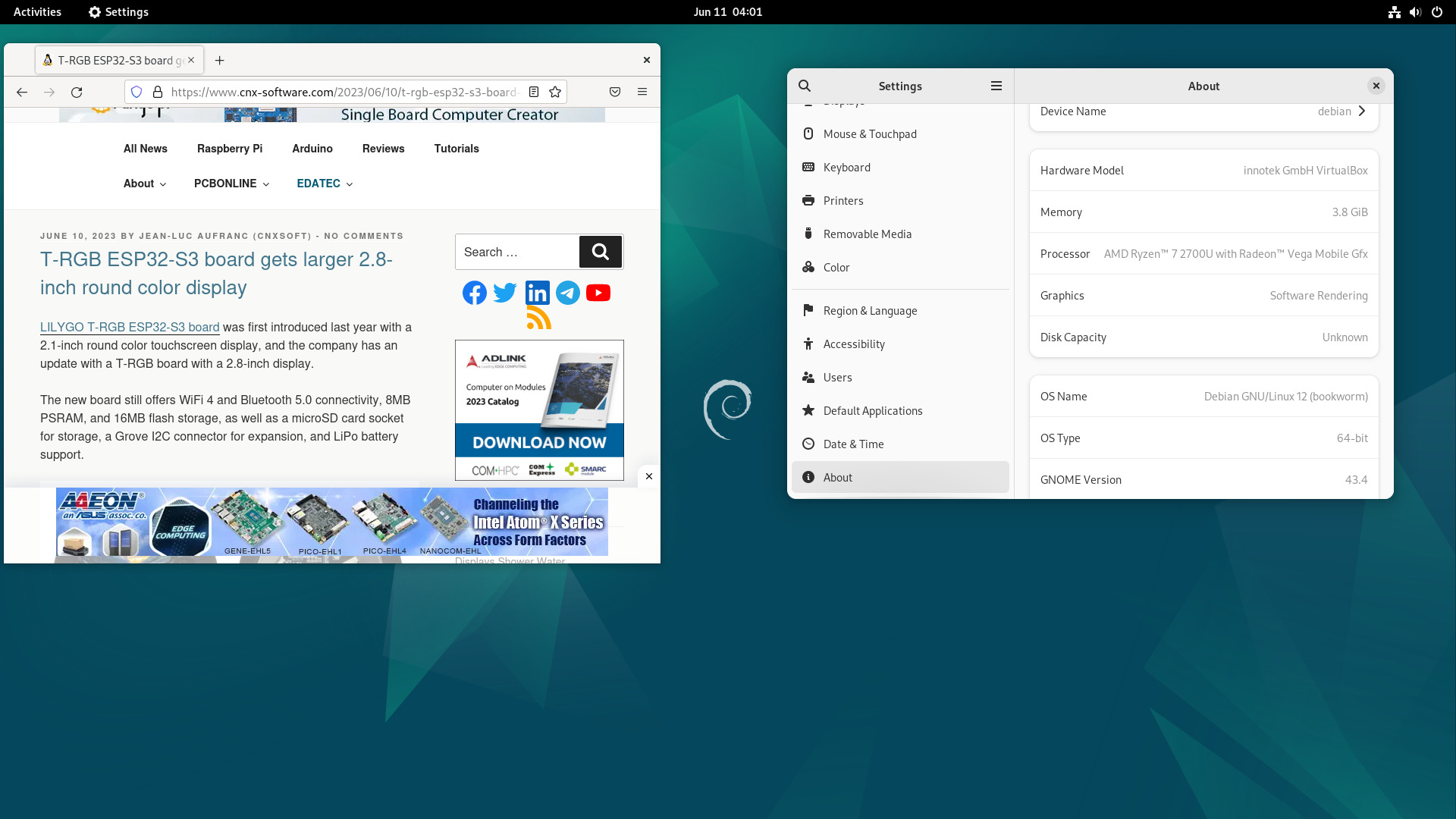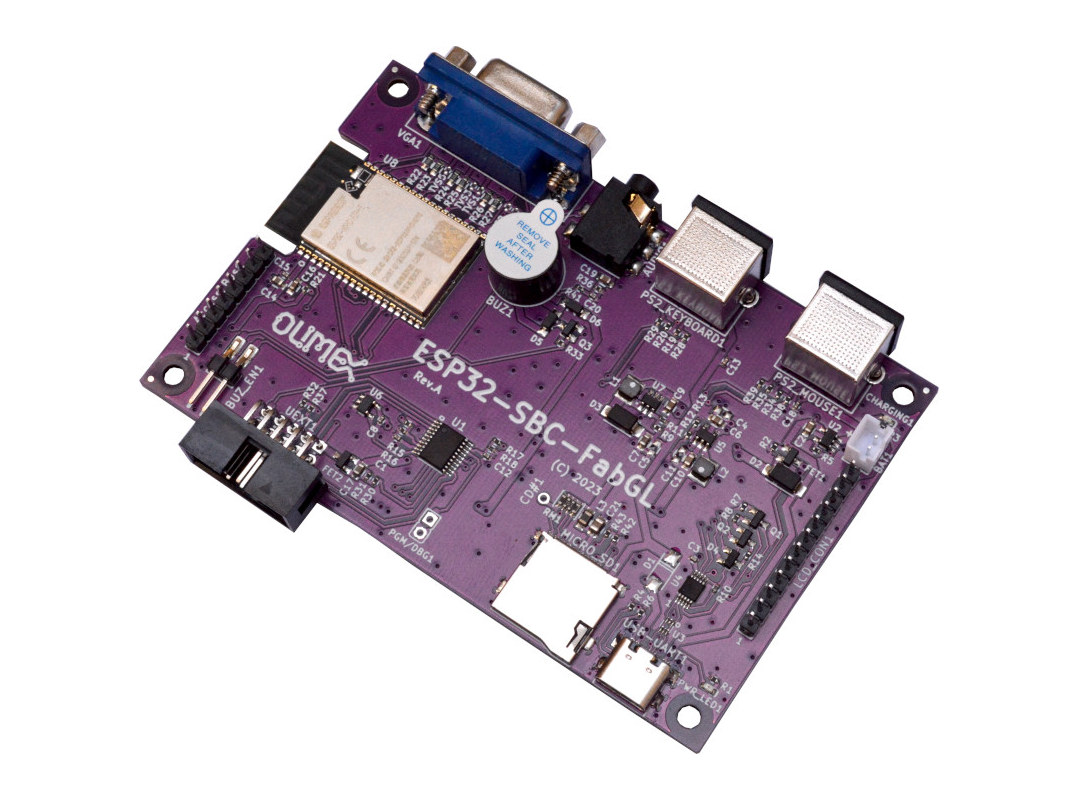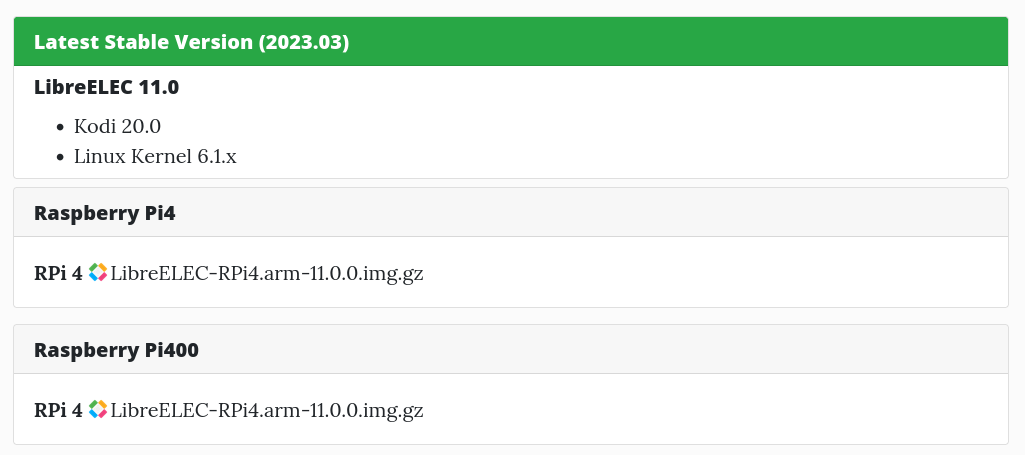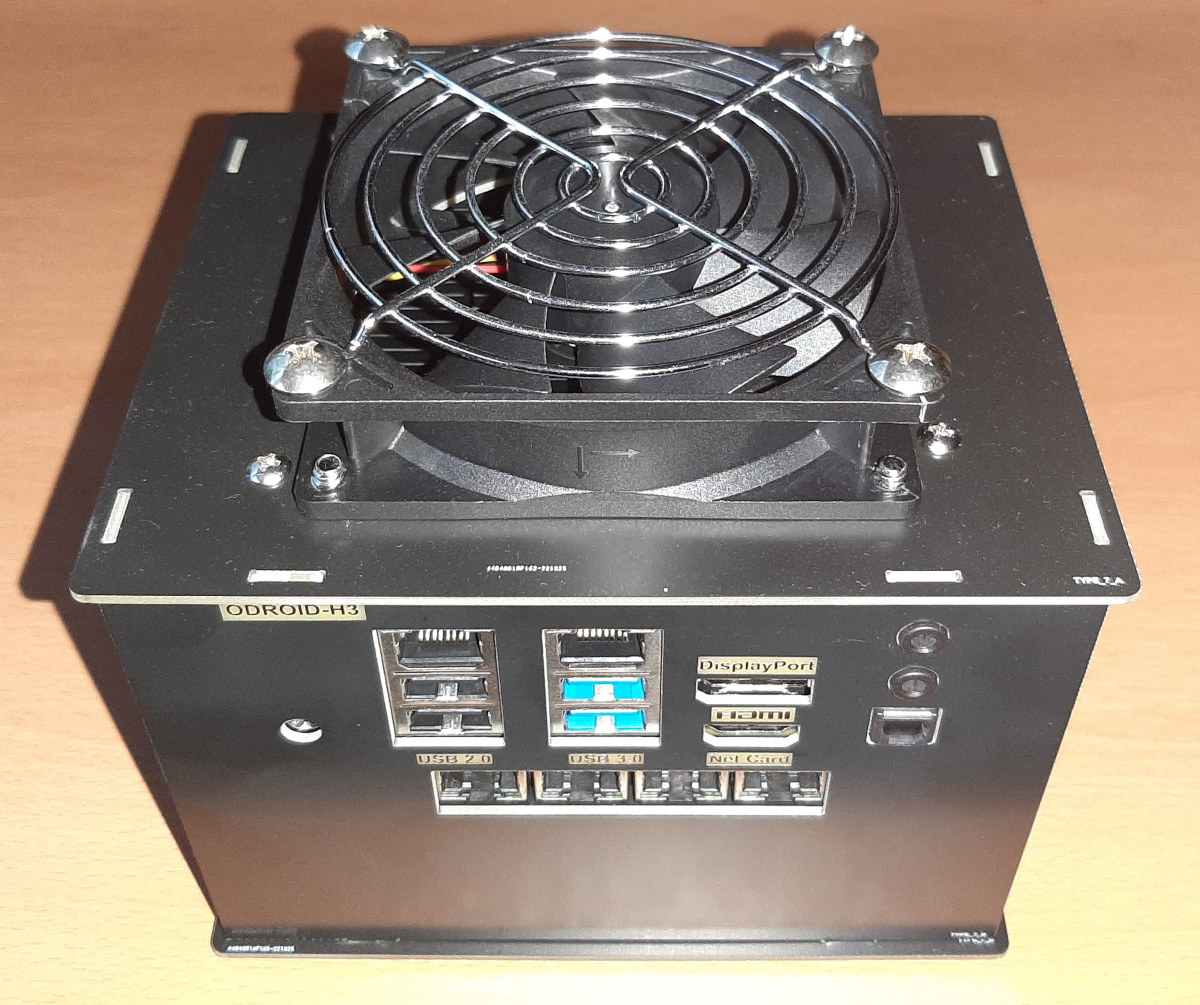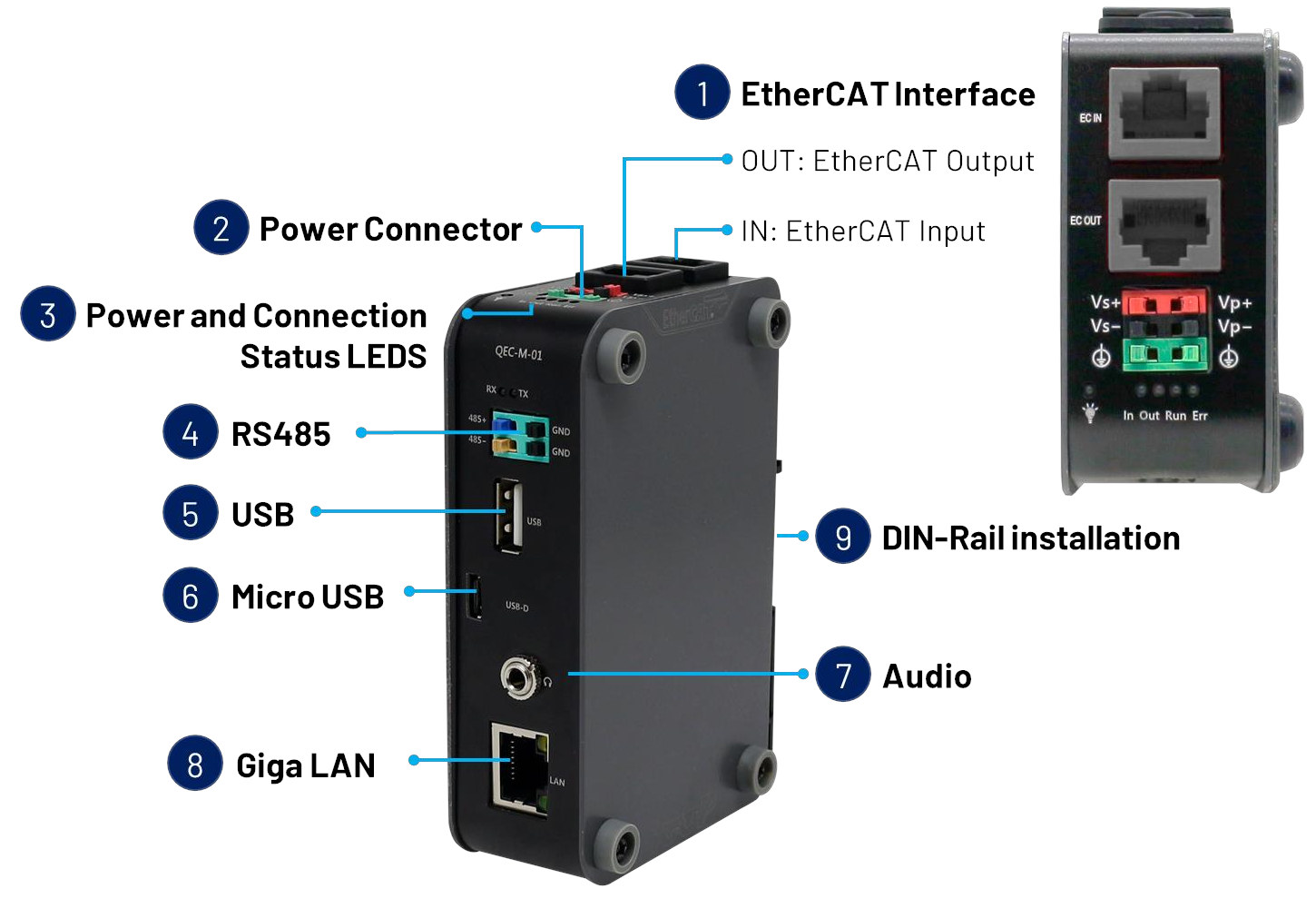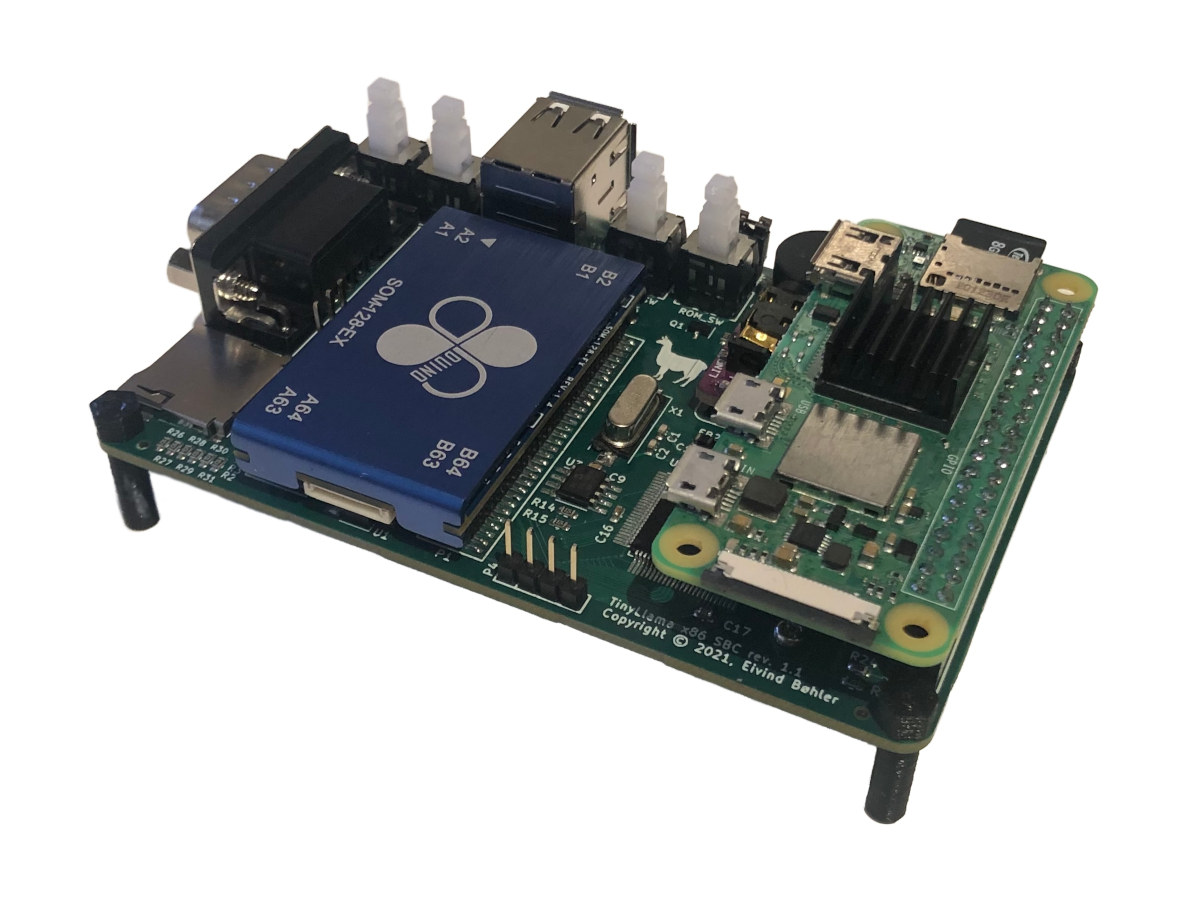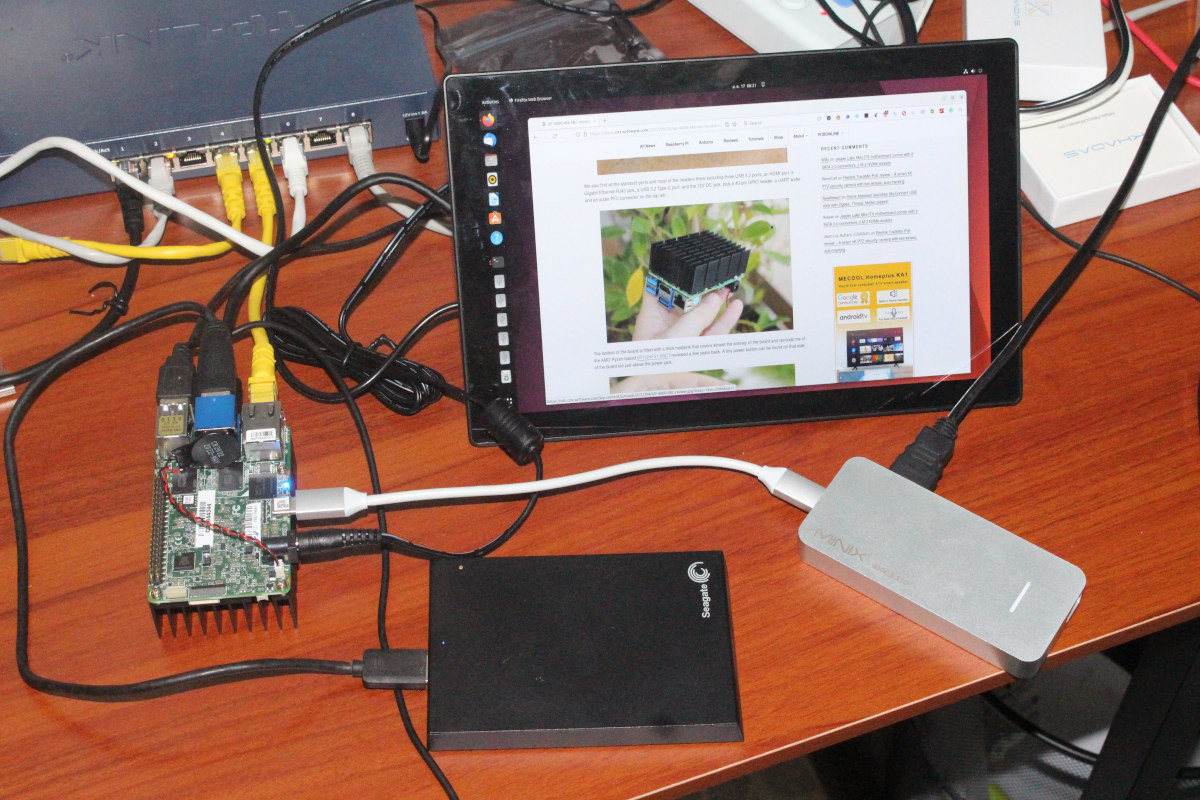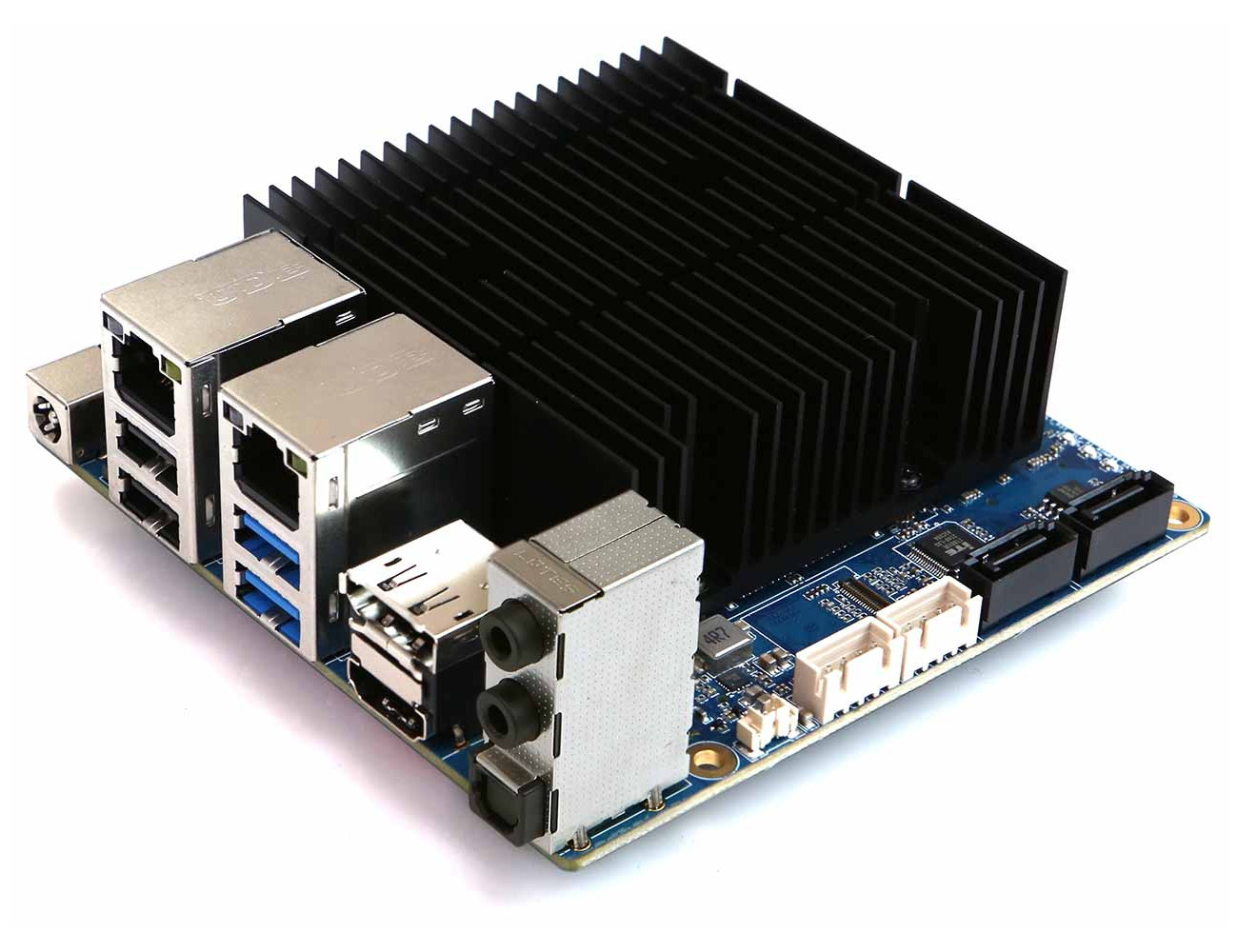Debian 12 “Bookworm” operating system has been released with an update to Linux 6.1 LTS and a new non-free-firmware repository making it possible to separate non-free firmware from the other non-free packages. This follows the Debian 11 “Bullseye” release in August 2021, and the version of Debian will serve as the base for other Linux operating systems such as Ubuntu and derivates, Raspberry Pi OS, and so on. Debian 12 can be downloaded on a choice of desktop environments, namely Gnome 43, KDE Plasma 5.27, LXDE 11, LXQt 1.2.0, MATE 1.26, and Xfce 4.18. Bookworm includes a total of 64,419 packages many of which have been updated the to latest version. Nine architectures are supported by Debian 12 “Bookworm”: 32-bit PC (i386) and 64-bit PC (amd64) 64-bit ARM (arm64) ARM EABI (armel) ARMv7 (EABI hard-float ABI, armhf) little-endian MIPS (mipsel) 64-bit little-endian MIPS (mips64el) 64-bit little-endian PowerPC (ppc64el) IBM System […]
Olimex ESP32-SBC-FabGL board runs DOS, offers VGA , PS/2 keyboard and mouse connectors
Olimex ESP32-SBC-FabGL is an ESP32 single board computer that can serve as the brain of a retro computer with a VGA port, a 3.5mm audio jack, and two PS/2 ports for a keyboard and mouse that are handled by the open-source FabGL graphics library. The board also comes with a microSD card slot, a buzzer, and various expansion interfaces, and can be powered via its USB port or a LiPo battery. FabGL implements several emulators including an Intel 8080 CPU emulator that allows the system to run various versions of DOS among other things. ESP32-SBC-FabGL specifications: Wireless module – ESP32-WROVER dual-core WiFi and Bluetooth module with 4MB flash, 8MB PSRAM Storage – MicroSD card slot Display – VGA connector, 12-pin LCD HAT connector to enable handheld designs Audio – 3.5mm audio jack, built-in buzzer USB – 1x USB-C port for power and programming User inputs – PS2 keyboard connector, PS2 […]
LibreELEC 11 released with Kodi 20, brings back Amlogic platforms
LibreELEC 11 lightweight media center Linux distribution based on Kodi 20 “Nexus” has just been released with various improvements on x86 and Arm platforms. Kodi 20 was released and available for download in January with AV1 hardware video decoding in Android and x86 (VAAPI) platforms with AV1-capable GPU or VPU, FFMPEG 4.4, Pipewire support in Linux, and a few others. LibreELEC 11 enables you to have a dedicated, and fast booting, HTPC based on a mini PC, a Raspberry Pi SBC, or an Arm-based TV box with all features from the latest Kodi release. LibreELEC 11 supports Raspberry Pi 2 to 4 SBCs, 64-bit x86 hardware, various Allwinner, Rockchip, and Amlogic SBCs and TV boxes with x86, Raspberry Pi, and Rockchip hardware considered more stable and feature complete. LibreELEC 10.0 did away with Amlogic TV boxes and single board computers because of driver issues, but LibreELEC 11.0 brings Amlogic back […]
ODROID-H3+ SBC review with “Unlimited Performance” mode and 2.5GbE Net Card
Hardkernel have added Intel Jasper Lake mini PCs to their ODROID-H series and they are known as the ODROID-H3 and ODROID-H3+. Like the discontinued ODROID-H2/H2+, this new series also supports the Net Card which will add four extra 2.5 gigabit Ethernet ports. Hardkernel kindly sent an ODROID-H3+ together with a selection of accessories for review and I’m going to look at the effect on performance when changing the Power Limit values in the UEFI (BIOS) together with the network performance of the Net Card. ODROID-H3+ hardware overview The ODROID-H3+ physically consists of a 110 x 110 mm (4.33 x 4.33-inch) motherboard complete with an Intel Pentium Silver Jasper Lake mobile N6005 processor which has 4 cores and 4 threads and can boost to 3.3 GHz and also includes Intel UHD Graphics. The processor, and nearly the entire motherboard, is covered by a large metal heat sink: The front of the […]
Arduino-programmable EtherCAT master runs FreeDOS on Vortex86EX2 x86 processor
ICOP QEC-M-01 is an EtherCAT master system running FreeDOS based on DM&P Vortex86EX2 dual-core x86 processor. It is programmable with an industrial Arduino IDE – the 86Duino IDE – that supports an EtherCAT API for real-time field monitoring and big data collection. The system can be used for industrial automation applications that require precise timing and it can monitor the hardware’s voltage, current, and temperature to calculate/estimate carbon emissions for industrial manufacturing to assist in the tracking of a factory’s carbon footprint. ICOP QEC-M-01 specifications: SoC – DM&P Vortex86EX2 dual-core processor with the Master core clocked up to 600MHz and the Slave core up to 400MHz System Memory – 1GB or 2GB DDR3 Storage – 32MB SPI Flash, MicroSD card, optional eMMC flash Networking Gigabit Ethernet RJ45 port 2x 10/100Mbps Ethernet RJ45 ports for EtherCAT master with support for CANopen over EtherCAT (CoE), File Access over EtherCAT (FoE), Distributed Clocks […]
TinyLlama x86 retro computer uses the Raspberry Pi Zero 2 W as a MIDI synthesizer
The TinyLlama x86 retro computer board is designed to run DOS games on a DM&P Vortex86EX 32-bit x86 processor and integrates a MIDI synthesizer based on Raspberry Pi Zero 2 running MT32-Pi firmware. Growing up playing games on 386/486-era computers, Eivind Bohler looked for similar recent hardware to play DOS games and after discovering the 86Duino x86 Arduino-compatible board, he decided to use the SOM-128-EX module powering the board to create the TinyLlama board with a Sound Blaster Pro-compatible Crystal CS4237B sound chip and a MIDI synthesizer. TinyLlama specifications: D&MP SOM-128-EX system-on-module with Processor – DM&P Vortex86EX 32-bit x86 processor @ 60 to 500 MHz System Memory – 128MB DDR3 Storage – 8MB SPI flash Storage – MicroSD card socket Video Output – VGA up to 1024×768 @ 60 Hz using the Vortex86VGA module running off an x1 PCI-e lane Audio Crystal CS4237B all-in-one audio chip MIDI synthesizer with Raspberry Pi […]
UP 4000 x86 SBC review with Ubuntu 22.04
The UP 4000 is a credit-card / Raspberry Pi-sized single board computer based on an Intel Apollo Lake processor. AAEON sent me the model with an Intel Atom x7-E3950 quad-core processor, 4GB RAM, and a 64GB eMMC flash, and in the first part of the review, I installed Ubuntu 22.04 since the board would initially only boot to the UEFI shell out of the box. I’ve now spent more time with the board, and in this article, I will report my experience with the UP 4000 SBC running Ubuntu 22.04 checking out features, performance, video playback, power consumption, and so on. Ubuntu 22.04 System info Let’s check out some information after I’ve upgraded the system to the latest packages:
|
1 2 3 4 5 6 7 8 9 10 11 12 13 14 15 16 17 18 19 20 21 22 23 24 25 26 27 28 29 30 31 32 33 34 35 36 37 38 39 40 41 42 43 44 45 46 47 48 49 50 51 52 53 54 |
jaufranc@UP-4000-CNX:~$ lsb_release -a No LSB modules are available. Distributor ID: Ubuntu Description: Ubuntu 22.04.1 LTS Release: 22.04 Codename: jammy jaufranc@UP-4000-CNX:~$ uname -a Linux UP-4000-CNX 5.15.0-48-generic #54-Ubuntu SMP Fri Aug 26 13:26:29 UTC 2022 x86_64 x86_64 x86_64 GNU/Linux jaufranc@UP-4000-CNX:~$ inxi -Fc0 System: Host: UP-4000-CNX Kernel: 5.15.0-48-generic x86_64 bits: 64 Console: pty pts/1 Distro: Ubuntu 22.04.1 LTS (Jammy Jellyfish) Machine: Type: Desktop Mobo: AAEON model: UP-APL03 v: V1.0 serial: <superuser required> UEFI: American Megatrends v: UPAPBM11 date: 07/01/2022 CPU: Info: quad core model: Intel Atom E3950 bits: 64 type: MCP cache: L2: 2 MiB Speed (MHz): avg: 1099 min/max: 800/2000 cores: 1: 1109 2: 1009 3: 1114 4: 1165 Graphics: Device-1: Intel Celeron N3350/Pentium N4200/Atom E3900 Series Integrated Graphics driver: i915 v: kernel Display: server: X.org v: 1.21.1.3 with: Xwayland v: 22.1.1 driver: X: loaded: modesetting unloaded: fbdev,vesa gpu: i915 tty: 80x24 resolution: 1280x800 Message: GL data unavailable in console. Try -G --display Audio: Device-1: Intel Celeron N3350/Pentium N4200/Atom E3900 Series Audio Cluster driver: snd_hda_intel Sound Server-1: ALSA v: k5.15.0-48-generic running: yes Sound Server-2: PulseAudio v: 15.99.1 running: yes Sound Server-3: PipeWire v: 0.3.48 running: yes Network: Device-1: Realtek RTL8111/8168/8411 PCI Express Gigabit Ethernet driver: r8169 IF: enp2s0 state: up speed: 1000 Mbps duplex: full mac: 00:07:32:a2:cd:17 Drives: Local Storage: total: 58.24 GiB used: 12.69 GiB (21.8%) ID-1: /dev/mmcblk0 vendor: SanDisk model: DA4064 size: 58.24 GiB Partition: ID-1: / size: 56.53 GiB used: 12.68 GiB (22.4%) fs: ext4 dev: /dev/mmcblk0p2 ID-2: /boot/efi size: 511 MiB used: 5.2 MiB (1.0%) fs: vfat dev: /dev/mmcblk0p1 Swap: ID-1: swap-1 type: file size: 3.96 GiB used: 0 KiB (0.0%) file: /swapfile Sensors: System Temperatures: cpu: 6280.4 C mobo: N/A Fan Speeds (RPM): cpu: 6553500 Info: Processes: 215 Uptime: 2h 20m Memory: 3.68 GiB used: 1.09 GiB (29.5%) Init: systemd runlevel: 5 Shell: Bash inxi: 3.3.13 |
Everything looks good with an Intel Atom E3950 processor detected together with 3.68GB RAM and a 56.53GB rootfs EXT-4 partition. UP 4000 features testing There may also be some issues […]
ODROID-H3 and ODROID-H3+ SBC’s feature Intel Celeron N5105, Pentium N6005 processor
There are now not one but two alternatives to the discontinued ODROID-H2+ SBC with the ODROID-H3 and ODROID-H3+ single board computers powered respectively by an Intel Celeron N5105 and Pentium N6005 Jasper Lake processor. Both new SBCs support up to 64GB RAM, significantly faster Intel UHD graphics, an M.2 PCIe Gen 3 socket, and keep the same port assignment with two 2.5GbE ports, two SATA ports, as well as two USB 3.0 and two US 2.0 ports. ODROID-H3/H3+ specifications: SoC ODROID-H3 – Intel Celeron N5105 quad-core Jasper Lake processor @ 2.0GHz / 2.9GHz (Turbo) with 24EU Intel UHD graphics @ 450 / 800 MHz (Turbo); 10W TDP ODROID-H3+ – Intel Pentium N6005 quad-core Jasper Lake processor @ 2.0GHz / 3.3GHz (Turbo) with 32EU Intel UHD graphics @ 450 / 900 MHz (Turbo); 10W TDP System Memory – Dual-channel SO-DIMM DDR4 memory (2933MT/s) supporting up to 64GB RAM in total Storage […]


